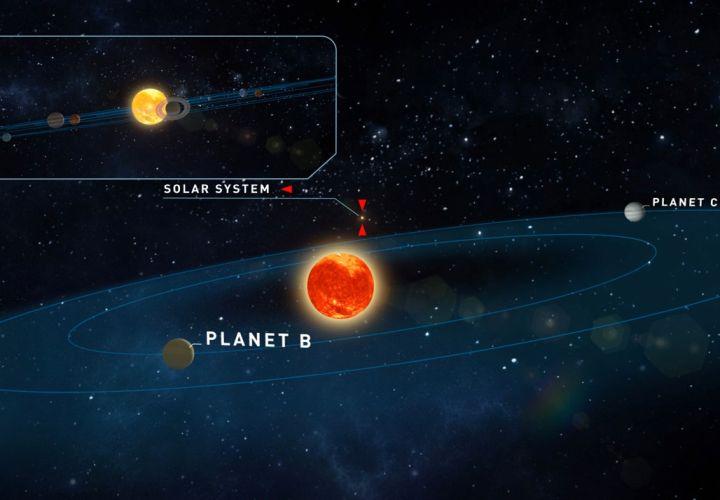International research team discovers two new Earth-like planets near Teegarden’s star

Credit: University of Göttingen, Institute for Astrophysics
An international research team led by the University of Göttingen has discovered two new Earth-like planets near one of our closest neighboring stars. “Teegarden’s star” is only about 12.5 light years away from Earth and is one of the smallest known stars. It is only about 2,700 °C warm and about ten times lighter than the Sun. Although it is so close to us, the star wasn’t discovered until 2003. The scientists observed the star for about three years. The results were published in the journal Astronomy and Astrophysics.
Their data clearly show the existence of two planets. “The two planets resemble the inner planets of our solar system,” explains lead author Mathias Zechmeister of the Institute for Astrophysics at the University of Göttingen. “They are only slightly heavier than Earth and are located in the so-called habitable zone, where water can be present in liquid form.”
The astronomers suspect that the two planets could be part of a larger system. “Many stars are apparently surrounded by systems with several planets,” explains co-author Professor Stefan Dreizler of the University of Göttingen. Teegarden’s star is the smallest star where researchers have so far been able to measure the weight of a planet directly. “This is a great success for the Carmenes project, which was specifically designed to search for planets around the lightest stars,” says Professor Ansgar Reiners of the University of Göttingen, one of the scientific directors of the project.
Although planetary systems around similar stars are known, they have always been detected using the “transit method” – the planets have to pass visibly in front of the star and darken it for a moment, which only happens in a very small fraction of all planetary systems. Such transits have not yet been found for the new planets. But the system is located at a special place in the sky: from Teegarden’s star you can see the planets of the solar system passing in front of the Sun.
“An inhabitant of the new planets would therefore have the opportunity to view the Earth using the transit method,” says Reiners. The new planets are the tenth and eleventh discovered by the team.
###
Carmenes is carried out by the universities of Göttingen, Hamburg, Heidelberg, and Madrid, the Max-Planck-Institut für Astronomie Heidelberg, Institutes Consejo Superior de Investigaciones Científicas in Barcelona, Granada, and Madrid, Thüringer Landessternwarte, Instituto de Astrofísica de Canarias, and Calar-Alto Observatory.
Further information can be found at https:/
Original publication: Mathias Zechmeister et al. The CARMENES search for exoplanets around M dwarfs – Two temperate Earth-mass planet candidates around Teegarden’s Star. Astronomy & Astrophysics 2019. DOI: 10.1051/0004-6361/201935460
Contact:
University of Göttingen
Institute for Astrophysics:
Dr Mathias Zechmeister
Tel: +49 (0)551 39-9988
Email: [email protected]
Internet: http://www.
Professor Ansgar Reiners
Tel: +49 (0)551 39-13825
Email: [email protected]
Internet: http://www.
Professor Stefan Dreizler
Tel: +49 (0)551 39-5041
Email: [email protected]
Internet: http://www.
Media Contact
Melissa Sollich
[email protected]
Original Source
http://www.
Related Journal Article
http://dx.




